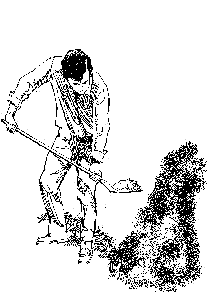|
|
|
 |
The Compost Pile (Fertilizer) |
|
| There is a sense in which the Cross
was the occasion for Jesus' being born again ... he had to totally start
over. The tomb became the womb for his rebirth. |
An important question to sort through
is whether being loved (our personal accepting of love from another) is an
act of humility or an act of arrogance? |
The Gospel of John (chapter 2 ff)
tells of the 6 stone jars each holding 20 to 30 gallons that Jesus had filled
with water, then turned the water into wine. Perhaps we should keep
6 stone jars handy just in case when Jesus comes, he wants to
party!? |
| Human beings are not one thing;
we are a multiplicity. Our understanding of the human condition is
not well served by zealous use of Ockham's Razor. That is not to say
that multiplicity precludes simplicity; "choas theory" observes that
simplicities, repeated, form patterned and predictable multiplicities (i.e.,
systems). Human beings are combinations, including: solids, liquids, gases, and energy. No matter which explanation is used to understand "the becoming of humanity" (whether evolution or creation), human beings are tied tothis creation, share this creation, and are immersed in the flow of life here as "a relative". We are a family member of Earth. Both evolution and creation observe that human beings spring from "dirt". The creation tradition observes that God spat and made clay and formed humankind. |
A persistent barrier to institutional change (especially change in churches) and to leadership is "the leader" (pastor?) who attempts to transplant ideas, values, systems, strategies into their home environment that come from "outside" instead of finding those ideas, values, systems, strategies (no matter how small ... "the mustard seed" sort of things) that lie and work in the native soil and only needs nurturing to really grow into viable solutions. | A major problem with the foreign solutions brought in to solve problems is that they often totally disrupt and displace the native systems (they become the "ficus fig trees" that threaten the Everglades). It is important to develop leaders who listen to how people live, and thus find solutions. In the church this means prophetic listening to the lives of people and to the "still small voice" of God that speaks in every day life. |
| Humility is a state of being in which a person stands in the truth with a knowledge and appreciation for him/herself as s/he really is. | The concept of time atomizes life. It emphasizes the trees and does not see the whole forest | |
| Self-deception (denial?) is the core of authoritarianism (and Phariseeism) and self-righteousness is its close companion | As long as one Christian still breathes, there is a house of God! No bricks or mortar are required! | We desperately need to rethink the "Incarnation" as God addressing the human condition. |
| Jesus was about re-inventing the world, and He turned everything up-side down in order to do it. | Who "owns" the Church? The Christ in People "own" the Church. | There is a lot more to Jesus than is in the Bible! |
| Is the mission of the Church anything less than mediating a compelling experience of the Risen Lord? | What would it mean for the Church to harness the learning process? | The Church has been so busy, it has allowed itself to get stupid! |
| What does the Church know? Where is that knowledge? | Church finance and stewardship is about more than Dead Presidents!!! |
Key Personal Questions are:
|
| The Church builds for 1000 years, but stiffles itself today. All change processesses are too long and complicated. |
What is the inheritance of the Church? Is it passivity? Then why get active? What are the rewards the Church gives for competency? | |